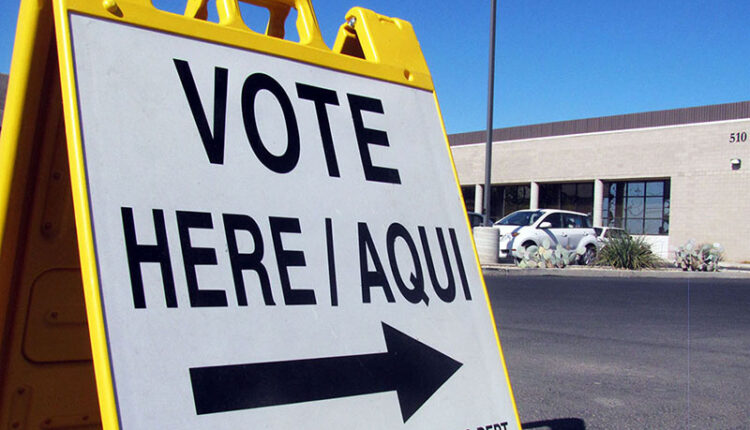Republicans want to limit voting to 1,000-voter precincts. Arizona would need more than 4,100.
In their continuing effort to upend how Arizona conducts its elections, Republicans in the state Senate want to force a return to precinct-based voting — with only 1,000 registered voters in each precinct.
This would drastically increase the number of precinct locations open across, with Arizona counties concerned about finding enough physical locations, as well as enough poll workers, not to mention the increase in ballots cast that inevitably won’t be counted.
There were more than 4.1 million people registered to vote in Arizona as of January, according to the Secretary of State’s Office. The GOP proposal would require more than 4,100 polling locations across the state if it became law.
House Bill 2547, sponsored by Rep. Rachel Jones, R-Tucson, passed through the state House of Representatives on Feb. 6, by a vote of 31-24, with only Republicans in support. It was approved by the Senate Elections Committee on Monday by a vote of 4-3, with Republican Sen. Ken Bennett, a former secretary of state, voting alongside the Democrats against the bill.
The bill also would eliminate in-person early voting locations.
“Vote centers are where the mischief occurs,” said Elections Committee Chair Wendy Rogers. “This is where commingling happens.”
Rogers is an election denier who has said that the 2020 and 2022 elections in Arizona were stolen from Donald Trump and Republican candidates for statewide office, respectively.
Several Arizona counties use a vote center model, in which any registered voter in the county can cast their ballot at any polling location in the county. In a precinct model, each voter can only cast a ballot at their designated location, and if they don’t cast their ballot at the correct location, it won’t be counted.
Arizona’s most populous counties, Maricopa and Pima, both use vote centers, and Yuma has used them for more than 10 years.
Jacob Emnett, a lobbyist for the County Supervisors Association of Arizona, said that the organization was opposed to the bill for several reasons, including that voting centers reduce the number of provisional ballots cast — the votes cast at the wrong location that aren’t counted. The supervisors also expressed concern that, in counties where voters are used to being able to cast a ballot at any polling location through the vote center model, a return to precincts will lead to confusion and voters turning up at a precinct where they legally cannot vote.
Supervisors in rural counties, in particular, said they were acutely worried about finding enough physical voting locations to comply with the bill.
In the 2022 general election, there were 223 voting centers open on Election Day in Maricopa County. Democratic Sen. Priya Sundareshan, of Tucson, told lawmakers on Monday that rough estimates show a need for around 1,800 voting locations in Maricopa County with a return to precincts with only 1,000 registered voters. As of February, there were more than 1.8 million registered voters in Maricopa County.
“It’s already a huge problem for counties to find poll workers,” Sundareshan said.
She added that Pima County’s move to vote centers has decreased costs to the county.
Emnett pointed out that Cochise County recently moved from precincts to voting centers for that reason: It couldn’t find enough volunteers to staff its precinct locations.
Rogers said that, with drastically increased interest in election in Arizona, she did not foresee any issues in finding people to staff the thousands of precincts that the bill would require.
“Plenty of people come to me, personally, wanting to volunteer,” she said.
Sandy Bahr, a lobbyist for the Grand Canyon Chapter of the Sierra Club, spoke against the bill, saying that voting centers and early voting locations made voting more accessible for people who work long hours, who lack childcare or who can’t make it to their precinct location on Election Day for various other reasons.
“Returning to a precinct model is taking a step backward for our elections,” Bahr said.
She added that, for many years, Arizona could be proud of its work toward increasing accessibility for voters and that it would be unfortunate to move in the opposite direction.
Before voting against the bill, Bennett said that voting centers have been used successfully in Yavapai County, where he lives, and around the state for years. Although there were problems in Maricopa County in 2022 with ballot printers, Bennett said banning voting centers was not the right solution.
“The solution is to fix those problems, not eliminate vote centers,” he said.
Next, the bill will move to the full Senate for consideration, but if the chamber approves it, the bill is almost certain to be vetoed by Democratic Gov. Katie Hobbs.



Comments are closed.